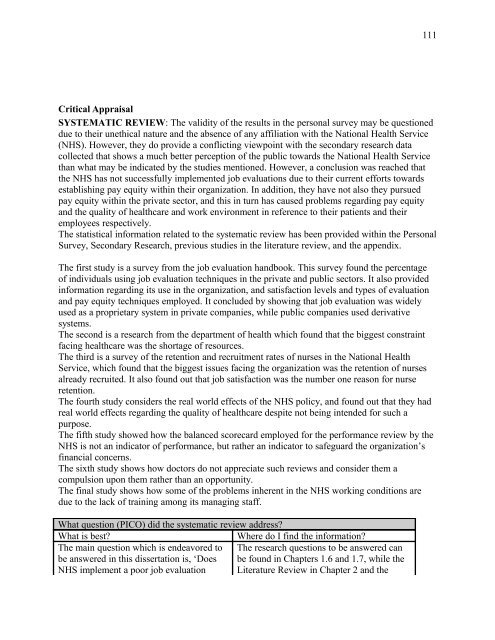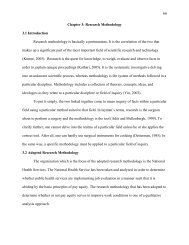111 Critical Appraisal SYSTEMATIC REVIEW: The ... - Dissertation
111 Critical Appraisal SYSTEMATIC REVIEW: The ... - Dissertation
111 Critical Appraisal SYSTEMATIC REVIEW: The ... - Dissertation
Create successful ePaper yourself
Turn your PDF publications into a flip-book with our unique Google optimized e-Paper software.
<strong>111</strong><br />
<strong>Critical</strong> <strong>Appraisal</strong><br />
<strong>SYSTEMATIC</strong> <strong>REVIEW</strong>: <strong>The</strong> validity of the results in the personal survey may be questioned<br />
due to their unethical nature and the absence of any affiliation with the National Health Service<br />
(NHS). However, they do provide a conflicting viewpoint with the secondary research data<br />
collected that shows a much better perception of the public towards the National Health Service<br />
than what may be indicated by the studies mentioned. However, a conclusion was reached that<br />
the NHS has not successfully implemented job evaluations due to their current efforts towards<br />
establishing pay equity within their organization. In addition, they have not also they pursued<br />
pay equity within the private sector, and this in turn has caused problems regarding pay equity<br />
and the quality of healthcare and work environment in reference to their patients and their<br />
employees respectively.<br />
<strong>The</strong> statistical information related to the systematic review has been provided within the Personal<br />
Survey, Secondary Research, previous studies in the literature review, and the appendix.<br />
<strong>The</strong> first study is a survey from the job evaluation handbook. This survey found the percentage<br />
of individuals using job evaluation techniques in the private and public sectors. It also provided<br />
information regarding its use in the organization, and satisfaction levels and types of evaluation<br />
and pay equity techniques employed. It concluded by showing that job evaluation was widely<br />
used as a proprietary system in private companies, while public companies used derivative<br />
systems.<br />
<strong>The</strong> second is a research from the department of health which found that the biggest constraint<br />
facing healthcare was the shortage of resources.<br />
<strong>The</strong> third is a survey of the retention and recruitment rates of nurses in the National Health<br />
Service, which found that the biggest issues facing the organization was the retention of nurses<br />
already recruited. It also found out that job satisfaction was the number one reason for nurse<br />
retention.<br />
<strong>The</strong> fourth study considers the real world effects of the NHS policy, and found out that they had<br />
real world effects regarding the quality of healthcare despite not being intended for such a<br />
purpose.<br />
<strong>The</strong> fifth study showed how the balanced scorecard employed for the performance review by the<br />
NHS is not an indicator of performance, but rather an indicator to safeguard the organization’s<br />
financial concerns.<br />
<strong>The</strong> sixth study shows how doctors do not appreciate such reviews and consider them a<br />
compulsion upon them rather than an opportunity.<br />
<strong>The</strong> final study shows how some of the problems inherent in the NHS working conditions are<br />
due to the lack of training among its managing staff.<br />
What question (PICO) did the systematic review address<br />
What is best<br />
Where do I find the information<br />
<strong>The</strong> main question which is endeavored to <strong>The</strong> research questions to be answered can<br />
be answered in this dissertation is, ‘Does be found in Chapters 1.6 and 1.7, while the<br />
NHS implement a poor job evaluation Literature Review in Chapter 2 and the
112<br />
system which undermines the successful<br />
implementation of the principles of pay<br />
equity in the healthcare organizations’ In<br />
order to answer this question, three sub<br />
questions are asked. <strong>The</strong>se questions are<br />
answered by the use of various literatures<br />
which are both directly and indirectly<br />
related to the topic, as well as a personal<br />
survey conducted by the researcher. <strong>The</strong><br />
results found that the NHS had not<br />
successfully implemented the principles of<br />
pay equity but observed that there were<br />
several improvements in pay equity within<br />
the organization.<br />
Personal Survey and Secondary Research in<br />
Chapter 4 encompass the information used<br />
to derive the conclusions given in Chapter 5.<br />
This paper: Yes<br />
Comment: <strong>The</strong> questions were addressed and the relevant information required to answer<br />
them was collected.<br />
F - Is it unlikely that important, relevant studies were missed<br />
What is best<br />
<strong>The</strong> secondary research detailed several<br />
studies from scholarly sources, as well as<br />
newspaper articles which detailed critical<br />
reviews of both NHS performance, job<br />
evaluation and also the working<br />
environment for both doctors and nurses.<br />
<strong>The</strong>re were also studies focused on the<br />
performance of the public sector in<br />
comparison to the private sector.<br />
Where do I find the information<br />
Methods: Searches were conducted using<br />
the internet and local libraries in order to<br />
find books which focused on job evaluation<br />
and pay equity. All official documents from<br />
the NHS were released on the NHS website<br />
and local libraries were used to research<br />
newspaper articles which directly provided<br />
an appraisal of NHS performance.<br />
Results:<br />
<strong>The</strong>re were several studies found which<br />
relayed information regarding the<br />
methodology and importance of job<br />
evaluations. <strong>The</strong>re were also several studies<br />
found which considered if the current<br />
proposals adopted by the NHS were helping<br />
or harming their status as a public health<br />
service. Though there was no direct study<br />
which encompassed all of these search<br />
criteria, inference from the researcher was<br />
required. All figures are catalogued in the<br />
index and appendices. It is conceivable that<br />
certain studies were missed; however, most<br />
of the relevant studies are present, which<br />
allowed this researcher to attain an accurate<br />
conclusion.
113<br />
This paper: Yes<br />
Comment: <strong>The</strong> information gathered may be incomplete and is missing certain studies<br />
although the studies do confer the researcher with the information necessary to answer the<br />
primary question of this dissertation.<br />
A - Were the criteria used to select articles for inclusion appropriate<br />
What is best<br />
<strong>The</strong> criteria required that all journal articles<br />
be from peer-reviewed sources.<br />
Information gained from books was<br />
verified by the use of journal articles and<br />
other literature, while all information<br />
provided from websites was insured to be<br />
from well-known organizations with<br />
projects related to the topic being<br />
researched.<br />
Where do I find the information<br />
Methods: Journal articles which were not<br />
peer-reviewed were excluded from the<br />
dissertation. This was also true for books<br />
which could not be verified by cross<br />
checking. Newspaper articles were insured<br />
to be from well-known newspapers while<br />
websites were excluded unless they were<br />
UK organization-based or well-known and<br />
updated.<br />
<strong>The</strong> terms used to search for these articles<br />
were the following:<br />
Job evaluation<br />
Pay equity<br />
Job evaluation in public sector<br />
Job evaluation in private sector<br />
Pay equity in public sector<br />
Pay equity in private sector<br />
Job evaluation in NHS<br />
Pay equity in NHS<br />
NHS<br />
NHS performance review<br />
NHS proposals<br />
Job equity in NHS<br />
This paper: Yes<br />
Comment: <strong>The</strong> criteria for the inclusion of articles insured that the information provided<br />
within the dissertation was as accurate as possible. It also ensured that all sources could be<br />
used without any reason for conflict due to the information provided.<br />
A - Were the included studies sufficiently valid for the type of question asked<br />
What is best<br />
<strong>The</strong> research study did not sufficiently<br />
meet the valid criteria to answer the type of<br />
questions asked within the dissertation.<br />
However, the other studies provided met<br />
the criteria mentioned above and were<br />
chosen based on their relation to the current<br />
topic.<br />
Where do I find the information<br />
Method: <strong>The</strong> validity of the personal survey<br />
was contingent upon its authorization by the<br />
department of health or any other governing<br />
body or organization. Meanwhile, the<br />
validity of the other research was contingent<br />
upon the criteria mentioned above.<br />
Results: <strong>The</strong> quality of the studies provided<br />
met the criteria detailed above and were thus<br />
used to form a conclusion to the research<br />
question put forth. However, the personal
115<br />
Yes, the research design was appropriate to adequately address the aims of the research. An<br />
analysis based on the 9 bands was included and a survey questionnaire was used to carry out the<br />
research.<br />
4. Was the recruitment strategy appropriate adequately to the aims of the research<br />
<strong>The</strong> Participants of the study were the participants that participated in this project are nurses and<br />
the supervisor of nurses that belong to regional and local hospitals.<br />
Data collection<br />
5. Were the data collected in a way that adequately addressed the research issue<br />
<strong>The</strong> researcher justified the methods used in the study and has not modified the method during<br />
the study in order to form a consistent outcome.<br />
6. Has the relationship between researcher and the involved participants been adequately<br />
considered<br />
<strong>The</strong> relationship between researcher and the involved participants remains unaddressed in the<br />
research article.<br />
Ethical Issues<br />
7. Have ethical issues been taken into adequate consideration<br />
Even though the researcher has not discussed how the ethical standards of the study were<br />
maintained the criterion utilized in the research is one that leaves little room for violation of<br />
research ethics.<br />
Data Analysis<br />
8. Was the data analysis sufficiently rigorous<br />
<strong>The</strong> data analysis was designed to be continuously rigorous with respect to the implementation of<br />
the research methodology of the research.<br />
Findings<br />
9. Is there a clear statement of findings<br />
<strong>The</strong> findings of the study are clearly presented and highlighted. <strong>The</strong> evidence is adequately<br />
discussed in order to reach a concise conclusion by use of the findings presented.<br />
Value of the research<br />
10. How valuable is the research<br />
<strong>The</strong> research furthers the existing knowledge of the National Health Service regarding its<br />
performance appraisals and also provides new avenues in which this study may proceed further.
Value of the research<br />
10. How valuable is the research<br />
<strong>The</strong> research makes a significant contribution to the understanding of the impact of different<br />
variables in job and work evaluation procedures and perceptions.<br />
117
Value of the research<br />
10. How valuable is the research<br />
<strong>The</strong> research is valuable in providing a decryption of aspects pertaining to job evaluation but<br />
does not present any significant findings.<br />
119
Value of the research<br />
10. How valuable is the research<br />
<strong>The</strong> research contributes to the paper by giving recommendations regarding the issues discussed<br />
within the study.<br />
121
123<br />
Findings<br />
9. Is there a clear statement of findings<br />
<strong>The</strong> findings have been discussed under the Results section. However, the credibility of the<br />
findings has not been discussed.<br />
Value of the research<br />
10. How valuable is the research<br />
<strong>The</strong> value of the research and the contribution the study makes to the existing knowledge of the<br />
issue in question have not been discussed. However, the research remains imperative to this<br />
study since it assists in the elaboration of factors that were essential to job evaluation.
Value of the research<br />
10. How valuable is the research<br />
<strong>The</strong> research attempts to unveil new horizons pertaining to job evaluation and is of the utmost<br />
value.<br />
125





